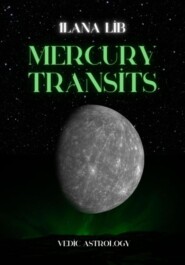По всем вопросам обращайтесь на: info@litportal.ru
(©) 2003-2025.
✖
The art of Jyotish: secrets unlocked
Настройки чтения
Размер шрифта
Высота строк
Поля
The cardinal signs are associated with curiosity and progress. If we have a person whose majority of planets in their natal chart are in cardinal signs, the traits characterizing their personality will be activity, curiosity, instability, agility, and volatility. Such traits will also be present in a person if their Moon and Lagna are located in cardinal signs.
If most planets are in fixed signs, it indicates a contemplative person, focused, prone to immerse themselves in details, and to ponder something for a long time.
Mutable signs include characteristics of movement and stability. In certain areas, these people can be active, but at some moment, they may "freeze."
Cardinal signs will always push the person forward, fixed signs will stop them, forcing the person to think before making decisions. Mutable signs will bring doubts to the person, creating difficulties in decision-making. It is hard to negotiate with such people. Each type has signs from all the elements (Fire, Water, Earth, Air).
Feminine and Masculine Signs
The same planet can govern a masculine sign and a feminine sign. For example, Venus rules the feminine sign—Taurus and the masculine sign—Libra. When talking about the power of the planet, it is important to know whether it expresses itself in a masculine or feminine nature. In a feminine sign (for example, Venus in Taurus), the planet will manifest in a softer way, whereas in a masculine sign (Venus in Libra), it will express itself in negotiation skills. For career, Venus heralds much better outcomes in Libra than in Taurus.
If most planets in the natal chart of a man are in masculine signs, then his masculine nature will express itself easily, and he will not have to learn it. If most planets are in feminine signs, the man will be soft, flexible, and have a tendency to do household chores.
If in the natal chart of a woman, most planets are in feminine signs, she will easily express her feminine qualities. If most of the stars in her chart are located in masculine signs, she will aim for a career and competition with men.
Living and Non-Living Indicators in the Horoscope
Each house in the horoscope carries living and non-living indicators. The planets Saturn, Mars, Ketu, and Rahu support non-living indicators and destroy living ones (they aspire to destroy, but do not completely destroy).
In the first house, the living indicator is the health of the person, while the non-living one includes the circumstances of birth, external appearance, and character.
In the second house, the living indicators are the parents, while the non-living ones are savings, wealth, finances, gold, mouth, tongue, and teeth.
In the third house, the living indicators are younger siblings, while the non-living ones are communication, hands, and expertise.
In the fourth house, the living indicator is the mother, while the non-living one includes the house and properties.
In the fifth house, the living indicators are children, while the non-living one is creativity.
In the sixth house, the living indicators are enemies, while the non-living one includes debts.
In the seventh house, the living indicator is the husband (wife), while the non-living one includes business.
In the eighth house, the living indicators are the parents of the husband (wife), while the non-living one includes inheritance.
In the ninth house, the living indicators are the father, the teacher, while the non-living one includes pilgrimage.
In the tenth house, there is only a non-living indicator, which is career.
In the eleventh house, the living indicators are friends, older siblings, and relatives who are older in age, while the non-living one includes profits.
In the twelfth house, the living indicators are enemies, and the non-living one is sleep.
The Periods of the Planets
The Vimshottari Dasha can be calculated on websites that compute horoscopes. There, all the periods and sub-periods of the planets in your life, starting from birth, are specified. Thus, one can always diagnose which planetary period you are currently in and which houses in the horoscope it influences. The periods of the nine planets pass one after the other in a specific sequence, and their complete cycle lasts 120 years.
Sun period – 6 years.
Moon period – 10 years.
Mars period – 7 years.
Rahu period – 18 years.
Jupiter period – 16 years.
Saturn period – 19 years.
Mercury period – 17 years.
Ketu period – 7 years.
Venus period – 20 years.
Sun Period
During these 6 years, when the energy of the Sun actively influences your life, there may be a rise in social status, promotion at work, or a job change. Furthermore, good results will manifest for those who have leadership characteristics, can make decisions independently, are precise, responsible, and just. For such individuals, the Sun period brings amazing opportunities in career, politics, and governance.
The Sun indicates in the natal chart the area of life where we need to develop and discover our potential. This is the house where the Sun is located and the house governed by the Sun. When the Sun period arrives in life, one must showcase their skills, become a leader, and take responsibility for everything. It is important for the person to be self-assured and learn to believe in their abilities. Someone may gain fame during this time, climb the career ladder, become a manager, or start a business. The person needs to find themselves, develop charisma, and be in the spotlight. These are all characteristics of Leo, which is governed by the Sun, meaning the Sun rules the house where Leo is located.
In addition, during this time, there may be changes in the father’s life or in the relationship with him. The Sun represents the father in the horoscope. During this period, there may be confrontations with him or resolutions to problems related to him. Something significant may happen in the father’s life during this time. The relationship with him should be improved. A desire to find him may arise if there was no connection with him before.
The outcomes of a person's actions during this period depend on the strength of the Sun in the person's horoscope. A weak Sun may lead to inflated ego, vanity, and conflicts related to the desire to be better than others. This may happen with authorities, older individuals, or people in high positions, and there may also be issues in the relationship with the father.
The Sun as the Ruler of Houses
The Sun as the Ruler of the First House
This means that the person loves to work, shines, utilizes their talents and abilities, has self-worth, knows their value, and enjoys having people work for them, helping them to realize themselves (Ascendant in Leo).
The Sun as the Ruler of the Second House
Such a situation tends to lead a person towards a managerial career as a director. Everything depends on the strength of the Sun in the horoscope. Finances will come from management. One must at least become an administrator for there to be any possibility of managing something.
The Sun as the Ruler of the Third House
One needs to develop artistic skills and hobbies, invest effort in order to discover oneself, and not work for someone else. It would be good to invent something new and unique.
The Sun as the Ruler of the Fourth House
The mother of such a person aspires to be the head of the household. In the house of the horoscope where the Sun is located, one can see the career of the mother, in what way she will realize herself. If the Sun is in a state of fall, the mother will have a low status; if the Sun is exalted, she will have a high status.
If the Sun is the ruler of the fourth house, it is important for the person that the house they live in reflects their inner world and serves as a sanctuary for their soul. Such individuals may suffer if their home is not at the level they desire.
The Sun as the Ruler of the Fifth House
Such a person considers their children as part of themselves, their continuation, and considers their mistakes as their own. If the Sun is well-placed, then the children will be the pride of the parents.

















